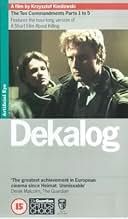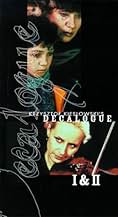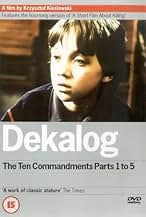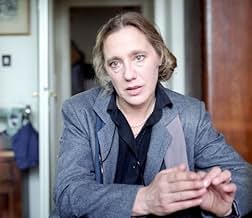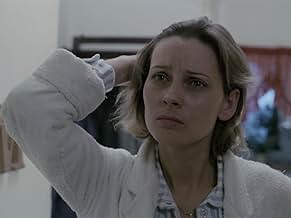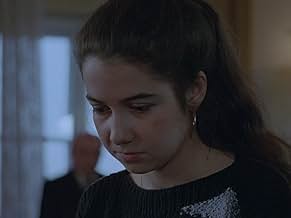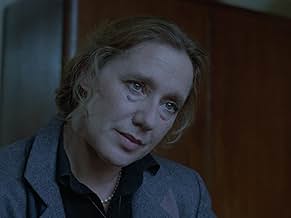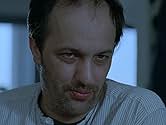Dekalog, jeden
- Episode aired Dec 10, 1989
- TV-MA
- 55m
IMDb RATING
8.5/10
8.1K
YOUR RATING
A woman worries about her nephew's spiritual education, whose life and his father's are run on their home computer.A woman worries about her nephew's spiritual education, whose life and his father's are run on their home computer.A woman worries about her nephew's spiritual education, whose life and his father's are run on their home computer.
- Director
- Writers
- Stars
Magdalena Mikolajczak
- Journalist
- (as M. Sroga-Mikolajczyk)
- Director
- Writers
- All cast & crew
- Production, box office & more at IMDbPro
Featured reviews
"I am the Lord thy God. Thou shalt have no other gods but me." One of the world's great humanist filmmakers, Kieslowski gives us a story of a rationalist father, a spiritualist aunt, and a boy trying to come to terms with their conflicting views of the world. The boy's father, a college professor, allows his son to go ice skating after proving to himself through physics that the ice is safe. Through Kieslowski's eyes, this seemingly small, simple plot affords a vehicle for metaphysical questioning and psychological exploration on a grand scale.
After decades, for me, it remains the best Christian film. For symbols and impecable cinematography. For the great performances. For the eyes of young Pawel. For the icon of Mother of God from Czestochowa. For the pictures of John Paul II. For the green screen of computer. And for something who escapes to words. A feeling, an emotion, a delicate sketch of pain, a lesson about faith and trust and illusion, the loss of God and the way to him. Each episode is an admirable job but the first , for me, remains Dekalog in the most profound sense. In past, it was significant for the clash of the fall of East European communism. In present, for the great art of an unique, pure genius director. A boy, his father, his aunt and a frozen lake. And the answer of a computer. A tragedy- its roots and meanings as a kind of mirror reflection.
'Dekalog' is a towering achievement and a televisual masterpiece that puts many feature films to shame. Although a big admirer of Krzysztof Kieślowski (a gifted director taken from us too early), and who has yet to be disappointed by him, to me 'Dekalog' and 'Three Colours: Red' sees him at his best.
Episode 1 of 'Dekalog' is one of its best episodes, and not only is it of the most thought-provoking and poignant pieces of television (or any kind of visual medium) there is but it's also one of the best first episodes personally seen for any television series. Would even go as far to say that it moved and interested me more than most thought-provoking and emotional feature films double its length.
As to be expected from Kieslowski, it is both beautiful and haunting to look at, with photography that's startling in its beauty and atmosphere. All of the 'Dekalog' series is visually stunning, and Episode 1 is one of the best-looking, and here especially in the final scene the photography actually enhances the emotional wallop to a scene that is heart-breaking already. The direction is intelligent and unobtrusive, while the music is hauntingly intricate.
The story is deliberately paced but never dull, the whole idolisation of science concept is explored with great intelligence while the final 10 minutes affected me (and very deeply) more than any other film or anything television-related in a while, much of it without dialogue and more through moods and expressions. The themes and ideals are used to full potential, and the characters and their relationships and conflicts feel so real and emotionally resonant without being heavy-handed. Despite being based around one of the ten commandments, don't let that put you off, resemblance to religion is relatively scant.
Couldn't have asked for better performances, Henryk Baranowski, Wojciech Klata and Maja Komorowska give remarkably complex and nuanced portrayals. Baranowski is especially outstanding, especially in the scenes detailing the aftermath of the tragedy, but Klata shows amazing maturity and naturalness for his age.
Overall, simply brilliant. 10/10 Bethany Cox
Episode 1 of 'Dekalog' is one of its best episodes, and not only is it of the most thought-provoking and poignant pieces of television (or any kind of visual medium) there is but it's also one of the best first episodes personally seen for any television series. Would even go as far to say that it moved and interested me more than most thought-provoking and emotional feature films double its length.
As to be expected from Kieslowski, it is both beautiful and haunting to look at, with photography that's startling in its beauty and atmosphere. All of the 'Dekalog' series is visually stunning, and Episode 1 is one of the best-looking, and here especially in the final scene the photography actually enhances the emotional wallop to a scene that is heart-breaking already. The direction is intelligent and unobtrusive, while the music is hauntingly intricate.
The story is deliberately paced but never dull, the whole idolisation of science concept is explored with great intelligence while the final 10 minutes affected me (and very deeply) more than any other film or anything television-related in a while, much of it without dialogue and more through moods and expressions. The themes and ideals are used to full potential, and the characters and their relationships and conflicts feel so real and emotionally resonant without being heavy-handed. Despite being based around one of the ten commandments, don't let that put you off, resemblance to religion is relatively scant.
Couldn't have asked for better performances, Henryk Baranowski, Wojciech Klata and Maja Komorowska give remarkably complex and nuanced portrayals. Baranowski is especially outstanding, especially in the scenes detailing the aftermath of the tragedy, but Klata shows amazing maturity and naturalness for his age.
Overall, simply brilliant. 10/10 Bethany Cox
Like in a Kafka book, a character is cool and rational, but suddenly sees everything around falling down. He painfully sees that the mystery of evil can't be explained by the faith in God or by the bare cause-effect paradigm. Mourning is indeed more painful, if you can't explain why an accident happens, and the movie is about this (or, my interpretation). Despite something ingenuity about computers and despite the low budget, the movie is tremendous and wonderful.
It's not necessary at all to repeat the worth and the offer of the 'Dekalog''s director in the cinema history and in the symbolic interaction. I read all the critic reviews that cover totally this part.
As the most of these reviews are written at about during the first decade of 2000's, I would like to underline the connection of this film in the 2020's. The technology steps on, but the uncertainty of the life doesn't change. This film should help us to realize that Artificial Intelligence and the digitalization of our lifes cannot transform the human nature in supernatural superiority.
"Thou shalt love the Lord thy God with all thy heart, and with all thy soul, and with all thy mind'. No matter if against that the communist computer science of the late '80s or the neo-liberal AI of the 2020s is placed.
As the most of these reviews are written at about during the first decade of 2000's, I would like to underline the connection of this film in the 2020's. The technology steps on, but the uncertainty of the life doesn't change. This film should help us to realize that Artificial Intelligence and the digitalization of our lifes cannot transform the human nature in supernatural superiority.
"Thou shalt love the Lord thy God with all thy heart, and with all thy soul, and with all thy mind'. No matter if against that the communist computer science of the late '80s or the neo-liberal AI of the 2020s is placed.
Did you know
- GoofsIn the scene where Krzysztof is in the bathroom and looks in the mirror to see the ambulance, the top of the head of the camera operator is also visible in the mirror.
- Quotes
Computer: I am ready _
Details
Contribute to this page
Suggest an edit or add missing content

